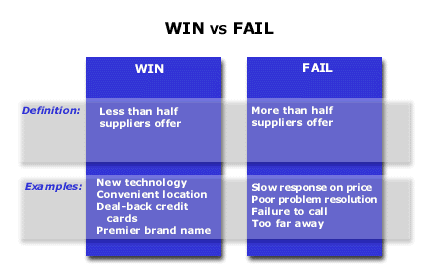Analysis 20: Win and Fail Definitions
EXHIBITS:

| HOW TO INTERPRET THE ANALYSIS: Explanation: This exhibit offers several examples of "Win" and a "Fail" events drawn from several industries. A Win occurs when less than half of the suppliers in the marketplace offer a particular benefit. An example of a Win might be a new technology, where one or more competitors offer a Function based on a new technology that others do not offer. A competitor might Win on the basis of a convenient location, closer to the customer than other competitors. A company might Win on a discounted price in the form of a rebate that other competitors do not match. A competitor might also Win by having a brand name that pulls customers to its products. A Failure occurs when more than half of the suppliers can or will offer the benefit to the customer. A company Fails when it has a slow response to another competitor's lower price. A competitor might Fail when, in the eyes of the customer, its response to a problem a customer had raised was ineffective or slow. A competitor might Fail by failing to call on the customer or by being located too far away for the convenience of the customer.
PURPOSE: The purpose of this analysis is to set a definition on what the company will call a "win," which is something offered by fewer than half the competitors in the marketplace, and a "fail," which happens when an incumbent supplier will not, or cannot, meet standards set by customer expectations. "Win Market" Examples » "Fail Market" Examples » APPROACH: Some market share changes because a competitor "wins" over all other competitors. It "wins" by offering something others are not offering. In other market situations, the market share moves only after an incumbent has "failed" his customer by being unable or unwilling to offer something that the customer would view as being offered by several other suppliers in the marketplace. The marketing and sales staffs should evaluate all benefits in the marketplace and then determine those benefits that can be called "win" benefits because they are offered by fewer than half of the competitors in the marketplace. All other benefits are sources of "failure" if a competitor does not offer them, or executes them poorly. The company should use this evaluation of "win" versus "fail" to determine what percentage of the marketplace changes volume because someone won rather than because the incumbent lost. If the market is predominately a "fail market," then the company will want to orient its marketing and sales calling tactics to attack the customers of weak competitors. If it is a "win market," the company should seek a leading role in the market on the kinds of benefits that create the "wins." Test Your Knowledge: Win vs. Fail >> Return to Diagnose Segments: Win vs. Failure |
|
Recommended Reading |
| For a greater overall perspective on this subject, we recommend the following related items:
Analyses:
Symptoms and Implications: Symptoms developing in the market that would suggest the need for this analysis.
Perspectives: Conclusions we have reached as a result of our long-term study and observations.
|
